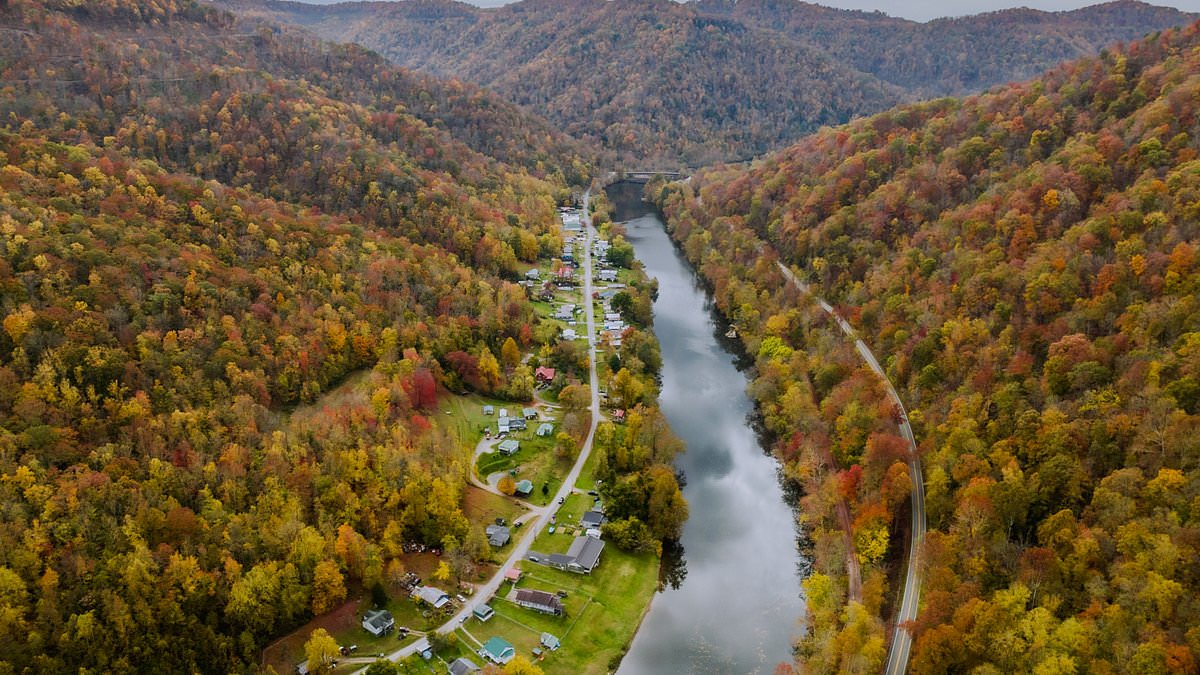Homebuyers are now flocking to an unlikely paradise – the Appalachian Mountains.
Greg and Missi Moore, once DC suburbanites living in a million-dollar home, have traded city life for mountain bliss.
The couple snagged a stunning Frank Lloyd Wright-inspired pad in West Virginia’s Glade Springs for a mere $675,000 – half the price of their former home.
‘They call me ‘The Anomaly’ down here, because I have all my teeth,’ Greg Moore, aka ‘Big Mo,’ told Realtor.com.
The Moores are now living in their affordable mountain retreat where they sit back outdoors and enjoy the fire on their deck, sipping wine and watching the wildlife nearby.
Both from West Virginia originally, they vowed to never come back. Now, Big Mo swears, ‘We’re never leaving.’
And they’re not alone – Appalachia is seeing a surge of new residents, with hoards of Floridians fleeing sky-high insurance costs and the scorching temperatures.
‘Data does seem to show an increase in movers from Florida to Southern Appalachia,’ says Hamilton Lombard, a demographer at Weldon Cooper Center at the University of Virginia who studies migration patterns.
Homes in Daniels, WV, are listing for a bargain $319,900 – that’s over $100,000 less than Florida’s median price.
But it’s not just about the money.
Jon Sinko of Bass Sinko Real Estate emphasized the ‘Mayberry RFD-type community’ feel, with friendly neighbors, low crime, and all four seasons.
‘A lot of people are definitely migrating here,’ Sinko told the outlet. ‘The affordability, the insurance, the simplicity of living in a Mayberry RFD-type community with friendly neighbors and low crime, and the ability to enjoy four seasons—these are just a few of the factors.’
The Moores are also thrilled to swap gators for ski slopes just 10 miles from their new home.
Appalachia is even becoming a cultural hotspot.
Berea, KY, was named the No. 1 ‘small-town art scene’ by Newsweek, and a West Virginia chef just snagged a prestigious James Beard award.
In March, it was reported that thousands of wealthy retirees were ditching Florida and choosing to spend their golden years in Appalachia instead.
With its warm weather and low tax burden, the sunshine state has long been known as the retirement capital of the US.
Yet Southern Appalachia, known for its stunningly beautiful views, is increasingly giving Florida a run for its money, Wall Street Journal reported.
But not everyone is happy about it.
The population in counties in southern Appalachia designated as retirement or recreational areas grew by 3.8 percent between April 2020 and July 2022 – more than six times the national average, according to Hamilton Lombard, a demographer at the University of Virginia.
But while older populations are attracted by cheaper living and housing costs, lower crime levels and pleasant weather with fewer hurricanes, some locals are furious about the impact this influx is having on property prices, traffic and even restaurant bookings – with one resident saying ‘they should go back to where they came from’.
Ed Helms, 75, and his wife moved from Panama City Beach, Florida to a gated community, half of it in Dawson and half in a neighboring county, to escape natural disasters, congestion, and the rising cost of living.
‘Our property insurance was going sky high,’ Helms, who worked in mergers and acquisitions, told the Wall Street Journal.
‘We got tired of being unable to find a place to sit in restaurants. Everything was getting out of reason. We wouldn’t go back for anything.’
People like the Helms are often referred to as ‘halfbacks’ – a nickname for those originally from the Northeast and Midwest who moved to Florida before eventually settling somewhere in the middle.
The trend back in the early 2000s and then slowed during the recession – but has now picked up again in earnest.
Gayle Manchin, the The Appalachian Regional Commission’s co-chair and wife of Democratic Senator Joe Manchin, told WSJ she believes the pandemic has fueled the retirees’ interest in moving back to more isolated, nature-filled areas.
According to Lombard of the University of Virginia, who has been tracking the pattern, an average of 328,000 individuals from other regions of the country have relocated to the five-state region of Georgia, Alabama, North Carolina, South Carolina, and Tennessee annually since 2020.
The Georgia county of Dawson has proven particularly popular, reporting a 12.5 percent population increase from 2020 to 2022, according to estimates by the U.S. Census Bureau.
But this huge influx has put enormous pressure on local services, leaving some lifelong residents like Helen Anderson unimpressed.
Anderson was born and raised in Dawsonville, Georgia, her family making ends meet by farming chicken and selling moonshine from the foothills of the Blue Ridge Mountains in Atlanta.
‘They ought to go back where they come from,’ she told the Wall Street Journal when discussing the newcomers.
Manchin told the WSJ that demand for affordable housing has skyrocketed as more workers are needed to serve the influx of halfbacks.
The migration of these wealthy retirees has spread governments thin as they trying to extend healthcare, housing, and other services to its citizens, she added.
But chairman of the Dawson County Board of Commissions Billy Thurmond noted that some of people who stop him to complain about the traffic and development are ironically the same people who moved to the county in recent years.
‘People who have moved here now want us to put up a gate and stop anybody else from moving here,’ he told WSJ. ‘It doesn’t work that way.’
County Manager Joey Leverette said medical calls to eldercare facilities in the county are also taking up resources. For that reason, county officials are considering splitting up staff to dedicate some to just emergency calls, freeing up teams to respond to fire calls.
‘It’s a game changer,’ Leverette told WSJ. ‘If we don’t get the funding, we’ll just have to keep plodding along as best we can.’
